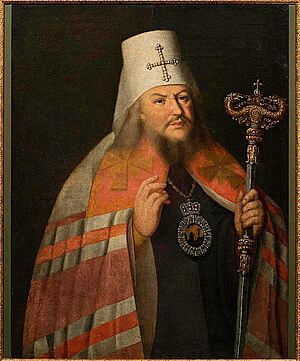Platon Levshin facts for kids
Quick facts for kids |
|
|---|---|
| Metropolitan and archbishop of Moscow | |

Plato II by an unknown painter, 1780–1790
|
|
| Church | Russian Orthodox Church |
| See | Moscow |
| Enthroned | 1775 |
| Reign ended | 1812 |
| Predecessor | Samoel of Krutitsy |
| Successor | Avgustin, Metropolitan of Moscow |
| Personal details | |
| Born | 29 June 1737 |
| Died | 11 November 1812 |
Platon II (born Platon Levshin, 1737–1812) was an important leader of the Russian Orthodox Church. He served as the Metropolitan of Moscow from 1775 to 1812. He is known for bringing ideas from the Age of Enlightenment into the church.
Contents
Early Life and Education
Platon Levshin was born on June 29, 1737, in Chashnikovo, a village near Moscow. His father was a psalmodist, someone who sings psalms in church. Platon studied at a seminary and later at the Slavic Greek Latin Academy in Moscow.
Becoming a Teacher
In 1757, Platon became a teacher of Greek and rhetoric at the Slavic Greek Latin Academy. He quickly became known as a great speaker. Soon after, he was asked to teach rhetoric at the Troitse-Sergiyeva Lavra, a famous monastery near Moscow.
Joining the Monastery
While at the Troitse-Sergiyeva Lavra, Platon became a monk and took the name Platon. In 1761, he became the head of the monastery's seminary.
Royal Teacher and Author
In October 1762, Platon gave a sermon that impressed Empress Catherine II. She invited him to her court to teach religion to her eight-year-old son, Paul Petrovitch.
Influences at Court
At court, Platon met famous thinkers like Voltaire. Even though these thinkers had different ideas, Platon kept his strong faith and good character. He stayed at the Russian court until Paul Petrovitch married Maria Feodorovna in 1773.
Writing for His Royal Student
During his time at court, Platon wrote a book for his royal student. It was called Orthodox Doctrine: or, A short Compend of Christian Theology (Moscow, 1765). This book showed some new ideas from Western thought. It also criticized certain Roman Catholic and Protestant beliefs.
Advocating for Dissenters
A year later, he wrote another book asking for kind treatment of people who disagreed with the Eastern Orthodox Church. This book was called Exhortation of the Orthodox Eastern Catholic Church of Christ to her former Children, now on the Road to Schism.
Church Leadership and Reforms
In 1768, Platon became a member of the Holy Synod, which is the highest governing body of the Russian Orthodox Church. In 1770, he was made bishop of Tver. He continued to live in St. Petersburg and teach the new grand duchess.
Archbishop of Moscow
In 1775, Platon became the archbishop of Moscow. He worked hard to improve the religious, moral, and educational life of his archdiocese. He also continued to write many books and sermons.
Writings for the Clergy and Children
In 1775, he published a catechism for priests. In 1776, he wrote a short catechism for children and another one as a dialogue. His brief history of the Russian Church (1777) was the first organized book of its kind in Russian.
Becoming Metropolitan
In 1787, Platon reluctantly agreed to become the metropolitan of Moscow. He often lived in monasteries near Moscow, like the Troitsky monastery and the Pererva Monastery. There, he personally guided the studies of seminary students. Three of these students later became archbishop of Moscow after him.
Treatment of Old Believers
Compared to earlier church leaders, Platon was more understanding towards the Old Believers. These were groups who had separated from the main church. He allowed them to build their first chapels in Moscow, including at the Preobrazhenskoe cemetery. He also supported a system called Edinoverie. This allowed Old Believer communities to join the main church while keeping their traditional ways of worship.
Later Life and Legacy
Platon crowned two emperors: Paul in 1797 and Alexander I in 1801. He always remained strong and independent, even with his close ties to the royal court.
Final Years and Contributions
Before he died, Platon helped prepare for the creation of the Russian Bible Society. This society was founded in the same year he passed away. He was evacuated from Moscow shortly before it was taken by Napoleon.
Published Works
Platon's collected writings were published in Moscow in 20 volumes between 1779 and 1807. Most of these writings were sermons, totaling about 500. Some of his works were also translated into English.
 | Charles R. Drew |
 | Benjamin Banneker |
 | Jane C. Wright |
 | Roger Arliner Young |

